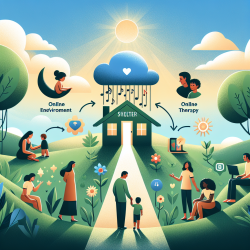Introduction
As practitioners dedicated to the well-being of young adults, it is imperative to understand the factors that facilitate or hinder engagement in mental health programs. The research article "An Exploration of Facilitators and Challenges to Young Adult Engagement in a Community-Based Program for Mental Health Promotion" provides valuable insights that can help us refine our approaches and improve outcomes for our clients.
Key Findings
The study identified four major categories influencing engagement:
- Reasons for Coming: Motivated to Work on Goals
- Facilitators of Engagement and Beyond
- Challenges to Engagement
- Benefits of Engaging: Finding My Way
Implementing Findings in Practice
To enhance engagement, practitioners should focus on creating a safe and supportive environment. This involves:
- Building Trust: Ensure that staff are non-judgmental and approachable.
- Encouraging Growth: Provide opportunities for skill development and personal growth.
- Helping to Connect: Facilitate social interactions and community-building activities.
- Helping to Transition Forward: Support clients in setting and achieving their goals.
Addressing Challenges
Challenges to engagement can be categorized into center-focused, participant-focused, and external factors. Practitioners should:
- Center-Focused: Ensure confidentiality and avoid actions that might make clients feel judged or exposed.
- Participant-Focused: Be sensitive to individual struggles and interpersonal dynamics.
- External Factors: Consider logistical issues such as transportation and weather that might affect attendance.
Benefits of Engagement
Engaging in mental health programs offers numerous benefits, including:
- Feeling Safe and Developing Trust: Clients feel secure and supported.
- Building Community: Enhanced interpersonal skills and a sense of belonging.
- Process of Building a Way Forward: Clients develop a more positive self-image and set future goals.
Conclusion
By implementing trauma-informed and healing-centered engagement practices, we can create a more supportive environment that fosters positive outcomes for young adults. Practitioners are encouraged to read the original research paper for a deeper understanding of these findings and their implications.
To read the original research paper, please follow this link: An Exploration of Facilitators and Challenges to Young Adult Engagement in a Community-Based Program for Mental Health Promotion.










